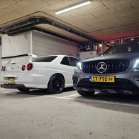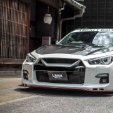Dyno tuning yourself.
Announcements
-
Similar Content
-
Latest Posts
-
I had 3 counts over the last couple of weeks once where i got stranded at a jdm paint yard booking in some work. 2nd time was moving the car into the drive way for the inspection and the 3rd was during the inspection for the co2 leak test. Fix: 1st, car off for a hour and half disconnected battery 10mins 4th try car started 2nd, 5th try started 3rd, countless time starting disconnected battery dude was under the hood listening to the starting sequence fuel pump ect.
-
This. As for your options - I suggest remote mounting the Nissan sensor further away on a length of steel tube. That tube to have a loop in it to handle vibration, etc etc. You will need to either put a tee and a bleed fitting near the sensor, or crack the fitting at the sensor to bleed it full of oil when you first set it up, otherwise you won't get the line filled. But this is a small problem. Just needs enough access to get it done.
-
The time is always correct. Only the date is wrong. It currently thinks it is January 19. Tomorrow it will say it is January 20. The date and time are ( should be ! ) retrieved from the GPS navigation system.
-
Buy yourself a set of easy outs. See if they will get a good bite in and unthread it. Very very lucky the whole sender didn't let go while on the track and cost you a motor!
-
Well GTSBoy, prepare yourself further. I did a track day with 1/2 a day prep on Friday, inpromptu. The good news is that I got home, and didn't drive the car into a wall. Everything seemed mostly okay. The car was even a little faster than it was last time. I also got to get some good datalog data too. I also noticed a tiny bit of knock which was (luckily?) recorded. All I know is the knock sensors got recalibrated.... and are notorious for false knock. So I don't know if they are too sensitive, not sensitive enough... or some other third option. But I reduced timing anyway. It wasn't every pull through the session either. Think along the lines of -1 degree of timing for say, three instances while at the top of 4th in a 20 minute all-hot-lap session. Unfortunately at the end of session 2... I noticed a little oil. I borrowed some jack stands and a jack and took a look under there, but as is often the case, messing around with it kinda half cleaned it up, it was not conclusive where it was coming from. I decided to give it another go and see how it was. The amount of oil was maybe one/two small drops. I did another 20 minute session and car went well, and I was just starting to get into it and not be terrified of driving on track. I pulled over and checked in the pits and saw this: This is where I called it, packed up and went home as I live ~20 min from the track with a VERY VERY CLOSE EYE on Oil Pressure on the way home. The volume wasn't much but you never know. I checked it today when I had my own space/tools/time to find out what was going on, wanted to clean it up, run the car and see if any of the fittings from around the oil filter were causing it. I have like.. 5 fittings there, so I suspected one was (hopefully?) the culprit. It became immediately apparent as soon as I looked around more closely. 795d266d-a034-4b8c-89c9-d83860f5d00a.mp4 This is the R34 GTT oil sender connected via an adapter to an oil cooler block I have installed which runs AN lines to my cooler (and back). There's also an oil temp sensor on top. Just after that video, I attempted to unthread the sensor to see if it's loose/worn and it disintegrated in my hand. So yes. I am glad I noticed that oil because it would appear that complete and utter catastrophic engine failure was about 1 second of engine runtime away. I did try to drill the fitting out, and only succeeded in drilling the middle hole much larger and now there's a... smooth hole in there with what looks like a damn sleeve still incredibly tight in there. Not really sure how to proceed from here. My options: 1) Find someone who can remove the stuck fitting, and use a steel adapter so it won't fatigue? (Female BSPT for the R34 sender to 1/8NPT male - HARD to find). IF it isn't possible to remove - Buy a new block ($320) and have someone tap a new 1/8NPT in the top of it ($????) and hope the steel adapter works better. 2) Buy a new block and give up on the OEM pressure sender for the dash entirely, and use the supplied 1/8 NPT for the oil temp sender. Having the oil pressure read 0 in the dash with the warning lamp will give me a lot of anxiety driving around. I do have the actual GM sensor/sender working, but it needs OBD2 as a gauge. If I'm datalogging I don't actually have a readout of what the gauge is currently displaying. 3) Other? Find a new location for the OEM sender? Though I don't know of anywhere that will work. I also don't know if a steel adapter is actually functionally smart here. It's clearly leveraged itself through vibration of the motor and snapped in half. This doesn't seem like a setup a smart person would replicate given the weight of the OEM sender. Still pretty happy being lucky for once and seeing this at the absolute last moment before bye bye motor in a big way, even if an adapter is apparently 6 weeks+ delivery and I have no way to free the current stuck/potentially destroyed threads in the current oil block.
-








Recommended Posts
Create an account or sign in to comment
You need to be a member in order to leave a comment
Create an account
Sign up for a new account in our community. It's easy!
Register a new accountSign in
Already have an account? Sign in here.
Sign In Now